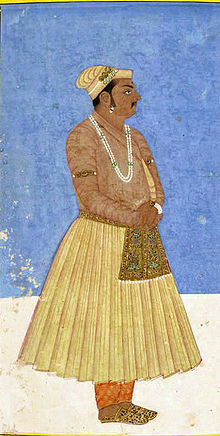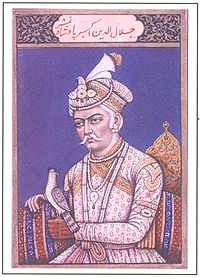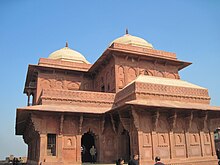The History Of Great Birbal
➣Birbal
| Birbal | |
|---|---|

Birbal
| |
| Born | Mahesh Das 1528 Sidhi, Sidhi, Madhya Pradesh, India |
| Died | 1586 (aged 57–58) Swat valley, present-day Pakistan |
| Spouse | Urvashi Devi |
| Issue | Saudamini (daughter) |
| Occupation | Main advisor in the Mughal court of Emperor Akbar |
Birbal (IPA: [biːrbəl]; born Mahesh Das; 1528–1586), or Raja Birbal, was a Hindu Brahmin advisor in the court of the Mughal emperor, Akbar. He is mostly known in the Indian subcontinent for the folk tales which focus on his wit. Birbal was appointed by Akbar as a minister "mantri" and used to be a poet and singer in around 1556–1562. He had a close association with Emperor Akbar and was one of his most important courtiers, part of a group called the navaratnas (nine jewels of Akbar). In 1586, Birbal led an army to crush an unrest in the north-west Indian subcontinent where he was killed along with many troops in an ambush by the rebel tribe. He was the only Hindu to adopt Din-i Ilahi, the religion founded by Akbar. Birbal was known as 9th gems of his empire Because of his bravery and intelligency
➣Early life
Birbal was born as Mahesh Das in 1528, in Hindu Brahmin family n district Sidhi, Madhya Pradesh, India; according to folklore, it was at Tikawanpur near the banks of river Yamuna. His father was Ganga Das and mother, Anabha Davito. He was the third son of a Hindu Brahmbhatt- family which had a previous association with poetry and literature.
Educated in Hindi, Sanskrit and Persian, Birbal wrote prose, specialised in music and poetry in the Braj language, thus gaining fame. He served at the Rajput court of Raja Ram Chandra of Rewa (Madhya Pradesh), under the name "Brahma Kavi". Birbal's economic and social status improved when he married the daughter of a respected and rich family, contrary to the notion that he was on poor economic terms before his appointment at Mughal Emperor Akbar's imperial cour
➣At the imperial court
Titles and name origin
The details and year of his first meeting with Akbar and his employment at the court are disputed but estimated to be between 1556 and 1562. He became the "Kavi Priya" (poet laureate) of the Emperor within a few years of his appointment. Akbar bestowed upon him the name 'Birbal' with the title "Raja", by which he was known from then on.
Birbal comes from Bir Bar or Vir Var which means courageous and great, quite contrary for him since he was not known for his bravery or for his military skill. Akbar gave titles to his Hindu subjects according to their traditions
➣Position and association with Akbar
His growing reputation led him to be part of Akbar's nine advisers, known as the navaratna - the nine jewels. Birbal also played the role of a religious advisor, military figure and close friend of the Emperor, serving him for 30 years. In 1572, he was among a large army sent to aid Husain Quli Khan against an attack from the Akbar's brother, Hakim Mirza, which was his first military role. He later accompanied the Emperor during his Gujarat campaigns.
Abu'l-Fazl ibn Mubarak and Abdul Qadir Badayuni were historians of the court. While Fazl respected him, listed him as having twenty five honorific titles and rank of a commander of two thousand; Badayuni distrusted Birbal because he was a Hindu, calling him a "bastard" and in contempt, writing how he, as a Brahman musician, was getting favour and becoming the king's "confidant", but at the same time acknowledging his talent. Akbar's other orthodox Muslim advisers were known to dislike Birbal.
Akbar had started a religion called Din-i-Ilahi, which acknowledged him as God's representative on earth and had a combination of Hindu and Muslim beliefs. In the Ain-i-Akbari (The Institutes of Akbar), it is mentioned that Birbal was one of the few people other than Akbar who were its followers, besides being the only Hindu.
The painting Akbari Nao Ratna in Victoria hall, Kolkata depicts Birbal having a prominent position right next to Akbar. The Emperor found him entertaining at the start but in later years, sent him on important missions. Birbal was said to have received a two-storey house in Fatehpur Sikri within the palace complex, built close to Akbar's own chambers. He was said to enjoy having Birbal by his side and he was the only courtier to reside within the palace complex. One of the seven gates is known as "Birbal's gate".
➣Death
The Afghani Yousafzai tribes had started a rebellion along the east bank of river Indus against the Mughal rule. After troops sent to crush the unrest suffered losses, Akbar sent Birbal with reinforcements from his new fort at Attock, to help the commander Zain Khan in 1586. Birbal and the army advanced into a narrow pass in Swat valley (in present-day Pakistan) where the Afghanis were waiting in prepared positions in the hills. In the ensuing ambush and heavy defeat, Birbal and over 8000 soldiers were killed. This was one of the largest military losses for Akbar. He was said to have expressed his grief over the loss his favourite courtier and not taken food or drink for two days. He was anguished since his body could not be found for Hindu cremation. He proclaimed that it was his greatest tragedy since his coming to the throne.
Badayuni writes,
➣Folklore and legacy
Origins
Akbar-Birbal folk tales were passed on mainly by oral tradition. They focus on how Birbal manages to outsmart envious courtiers who try to trap and portray him in poor light in front of Akbar, often in a humorous manner with him shown giving sharp and intelligent responses. Others show his interactions with the Emperor which involve him trying to test Birbal's wit and Birbal making him realise his folly, which always ends with Akbar getting amused and impressed. He occasionally challenges Birbal by giving him a line of poetry which Birbal has to complete. Some of the other stories are simple humorous anecdotes.
➣Historic role versus folklore
In the folk tales, he is always portrayed as a pious Hindu, being elder than Akbar, and being morally strict in the midst of opposing Muslim courtiers, who are shown plotting against him; his success was only because of his skill and he convinces the Emperor to favour Hinduism over Islam. He is thus depicted as acquiring religious, political and personal influence over Akbar, using his intelligence and sharp tongue and never resorting to violence. However, historically he never played such a role.
Modern Hindu scholars assert that he made Akbar make bold decisions and the orthodox Muslims in the court despised him, since he made Akbar renounce Islam.
➣In popular culture
Akbar and Birbal folk tales are featured in Amar Chitra Katha and Chandamama children's comics and many books are available containing these collections.There are various paperback editions, films, textbooks, booklets and plays with his character as the lead. The television channel Cartoon Network in India, has two featured animated series based on him, Chota Birbal and Akbar & Birbal. Salman Rushdie's novel The Enchantress of Florence has the character of Birbal. Akbar Birbal is a 2014 historical comedy broadcast by Big Magic.


Comments
Post a Comment